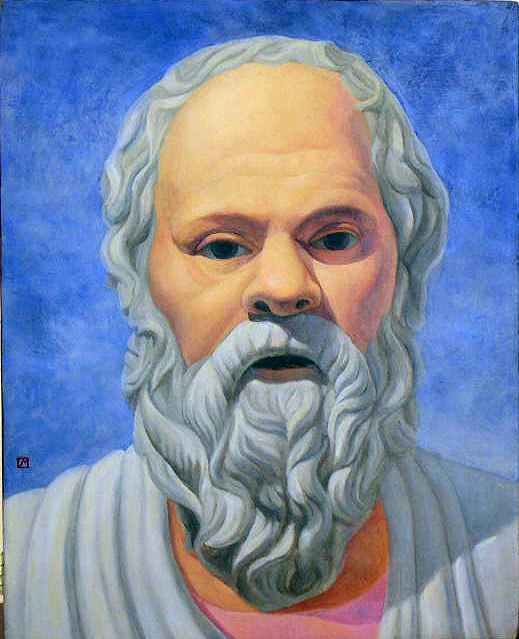
Socrates (470-399) was a western
philosopher from Athens, Greece.
He believed in the reincarnation of
an eternal soul which contained all knowledge. He believed in immortality of
the soul.
The soul dies but is reborn and thus never destroyed. "Then, since the
soul is immortal and often born, having seen what is on earth and what is in
the house of Hades, and everything, there is nothing it has not learnt; so
there is no wonder it can remember about virtue and other things, because it
knew about these before. For seeking and learning is all remembrance."
He did not agree with the teaching
of the idea that all things are relative. Socrates was more interested in
finding the truth. However, he thought
people needed to be reminded of what we already know, instead of learning
something new. Socrates suggests that we all desire good things.
Socrates placed importance on
virtue, but claimed that no one really knows what virtue means. He said that
nobody has the same virtue, consider a free man and a slave. He argued with Menon
who claimed virtue is role specific. However, all virtues have one something
the same in all that makes them virtues. He also believed that ethics meant to
think about life, and the importance of individual consciousness.
Socrates was a teacher, although he
argued there was no such thing as teaching, only remembering. His use of
questions and answers to remind his students of knowledge is called the
Socratic Method. He enjoyed having long discussions with his
students, but not documenting his thoughts. One of his most famous students was
Plato. The only resources left for historians to draw conclusions from about
Socrates are the writings of Plato. A set of his writings about the discussions
between Socrates and his students is known as the Dialogs. However, many
historians feel that Plato may have written these dialogues more in favor of
his own beliefs rather than Socrates.
Socrates was sentenced to death by
the citizens of Athens because he was teaching his political and religious
views to the youth. They felt he was corrupting the morals of the youth of the
city. In 399, he was ordered to drink a brew of poison hemlock. He did this in
the present of his students. We know about this event only because of its
documentation in Plato’s Apology.
Sources; http://webspace.ship.edu/cgboer/athenians.html
http://myweb.wvnet.edu/~jelkins/pmpl99/fragments/platovirtue.html
Sources; http://webspace.ship.edu/cgboer/athenians.html
http://myweb.wvnet.edu/~jelkins/pmpl99/fragments/platovirtue.html
No comments:
Post a Comment
Note: Only a member of this blog may post a comment.